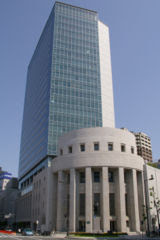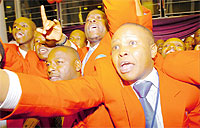 After reading Bankelele's Blog, on (Poor) defence of MPs salaries that also touched on the emotive issue of Constituency Development Fund (CDF) i pondered for a while then thought of revisiting an exposition i had done before on CDF in Kenya.
After reading Bankelele's Blog, on (Poor) defence of MPs salaries that also touched on the emotive issue of Constituency Development Fund (CDF) i pondered for a while then thought of revisiting an exposition i had done before on CDF in Kenya.
CDF:
The concept of the
Constituency Development Fund (CDF) that was adopted by the Kenyan Parliament through a bill by Hon. Eng. Karue has been applauded for enhancing constituency development across the country.
The Constituency Development Fund (CDF) was created in Kenya in 2003 through an
Act of parliament to
“fight poverty at the grassroots level through the implementation of community based projects which have long term effects of improving the peoples’ economic well being…
(and to) relieve members of parliament from the heavy demands of fund-raising for projects which ought to be financed through the Consolidated Fund.Percentage Distribution:
The CDF fund comprises an annual budgetary allocation equivalent to
2.5% of the government's ordinary revenue although there has been
lobbying to see the fund increased to
7.5% of government’s revenue.
75% of the fund is allocated equally amongst all 210 constituencies. The remaining
25% is allocated as per constituency poverty levels, population size and the size of the constituency.
A maximum 10% of each constituency’s annual allocation may be used for an education bursary scheme, 3% for administration and 5% to cater for any emergencies.
The fund is managed through 4 committees 2 of which are at the national level- The National Management Committee (NMC),and Constituency Fund Committee (CFC) and 2 at the grassroots level-The Constituency Development Committee (CDC) and District Projects Committee (DPC).
Despite being a
noble idea there are concerns thus;
Concerns:
Inadequacy: There are also the issues of inadequacy of the amounts disbursed for projects at the various levels to fund development projects.
Projects Funded: Other issues revolve around the stipulations of the CDF Act of 2003 that the projects to be funded should ONLY (Note only, which is limiting) include:
1. Schools-nursery, primary and secondary constructions, extensions, libraries, staff quarters to cater for the increased number of students due to Free primary Education (FPE).
2. Agricultural projects e.g. cattle dips, irrigation, community farming etc
3. Water-boreholes, drilling, drainage etc
4. Eletricity projects-Rural Electrification, lighting public institutions etc
5.Health projects-Dispensaries, health centers, mobile clinics etc
6. Bursary (10%)
7. Emergency Fund (5%)
8. Administration (3%)
9. Security-Police posts, administration camps, security apparatus
Patronage in Appointments: The Act stipulates that the Member of Parliament (M.P) is mandated to select the members of the Constituency development Committee (CDC) that wil be charged with projects identification, selection, funding, monitoring and evaluation at the grassroot level. This has been marred with patronage and installing of close associates of the M.P at the expense of development oriented persons.
Corruption: some Members have been accused of funding projects in areas where they have massive support and are likely to get substantial votes at the expense of equitable distribution.
Misuse of Funds/Ghost projects: I have learnt from reliable sources that some M.Ps have been amassing wealth and campaign money through ghost projects allegedy funded then latter diverted to enrich their pockets within the knowledge of a few confidantes.
Slow projects implementation: CDF fund is normally issued every year and since inception it has increased marginally to the current total cfugure of Ksh 10 Billion with each constituency getting between 37 Million and Ksh 60 Million during the FY 2007/08. However some constituencies have been slow to implement their projects with other including Kamukunji shelving the money for 3 consecutive years with claims that they were wating for the funds to be 'enough', talk about greed. This slow implementation hampers regional development.
Poor Traning of Personnel: Further, there has been slow and inefficient training of persons involved in running the fund at the grassroot level including CDC committees. Most of them have low credentials as far as proposals writing, projects analysis, monitoring and evaluation as as as accounting for funds is concerned since their appoinments is based on political affiliation.
Imperatives:
1.Scope of projects: It is imperative to widen the scope of projects to be funded under CDF as opposed to the parochial funding of only schools, health centers, electricity and agriculture.The funds can also allocate some percentage of CDF for entrepreneurial ventures in the constituency so as to inculcate a culture of small business development and management while providing the requisite financial support.
Investigate corruption allegations: There is need to swiftly investigate allegation of corruption and embezzlement of the fund that had been levelled against some members.
CDF Audit: NMC should institute periodic audits of the CDF funded projects to establish their current status and properly ascertain whether they were actually real or 'ghosts'. this will enhance accountability.
Infrastructural development: This is key and the development of the transport and communication sector is paramount in reducing the cost of inbound logistics and eventual costs of outputs within the value chain process. CDF should also focus on this vital element.
Policies: Our country needs visionary leaders who can go beyond their selfish interests to developing programs and policies geared towards enhancing equity in resource distribution, proper security apparatus, boosting agriculture and encouraging merit and excellence as opposed to corruption and embezzlement of the funds within the public coffers. It is high time we elect such leaders if Kenya is to be an economic powerhouse, a tiger of some sort within the expansive African Continent.
Extensive Training: It is vital to institute extensive training of persons involved in the implementation and management of CDF funded projects both at the National level and the Grass root level inorder to enhance performance, accountability and efficiency.
Delinking from politics: There is an urgent need to delink the process of CDF management and disbursement from any political influence through empowering thr National Management Committee (NMC) to operate freely without the whims of politicians.
Constituency Account Managers: In the critical process of delinking CDF from political influence, there is need to hasten the employment of Costituency Account Managers who will be charged with the reponsibility of disbursing,managing, monitoring and evaluating the CDF fund in the constituencies.
Just a Thought!
By the way the NMC in collaboration with
parliament started the process of employing CDF managers 6 months, in March 2007 when the posts were advertised in the local dailies. Interviews were done 3 months latter in June 2007 and work was meant to start in July 2007 in line with the commencement of the 2007/08 financial year. As of now, close to September, no CDF managers are in office to manage CDF and parliament will be dissolved any time soon. One is left wondering as to who will be incharge of managing the CDF funds once M.Ps are out of parliament and moreso when it is widely known that nearly 90% of them will not step back to the August House according to recent survey.
Wont they missaproriate this funds??? Bloggers should help out highlight this issue!!!!




















